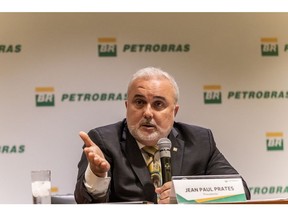Article content
(Bloomberg) — Latin America’s biggest oil company will be more cautious about issuing blockbuster dividends as it moves to become a renewable energy powerhouse, Petrobras Chief Executive Officer Jean Paul Prates said in an interview.
In 10 years about half of Petrobras’s revenue will come from wind, solar and renewable motor fuels — and the company is gearing up to make acquisitions as early as this year to propel the shift, Prates said in a wide-ranging interview. The Brazilian producer also needs to spend heavily on oil exploration at home and abroad to guarantee that it will continue pumping crude for decades.
Article content
“We need to be cautious. Shareholders will understand,” Prates said from Bloomberg’s office in Sao Paulo, when asked about an extraordinary dividend payment. “I would be more conservative than aggressive. We are in the middle of this great decision of becoming an oil company in transition.”
Analysts see room for Petroleo Brasileiro SA, as the company is formally known, to reward investors with billions of dollars in extraordinary dividends, which are expected to be announced when it reports earnings March 7. Citigroup Inc. sees space for up to $7 billion, while Goldman Sachs Group Inc. forecasts as much as $8 billion. Petrobras was the second-biggest payer of dividends in the oil industry in 2022 behind Saudi Aramco.
Petrobras’s determination to plow ahead into clean energy contrasts with some of its international peers. European heavyweights Shell Plc and BP Plc have pivoted away from renewables to focus more on fossil fuels. US oil majors Chevron Corp. and Exxon Mobil Corp. never made wind and solar a priority and have focused their business plans on oil and gas.
Article content
Read More: BP Activist Sees Sign of Strategy Shift But Wants Bolder Action
The 55-year-old executive, who took the helm at Petrobras in January 2023, ruled out making “drastic turns” in strategy. But he said the company needs to be prepared for acquisition opportunities in both renewables and oil, as well as petrochemicals and fertilizer production. Petrobras is looking at investing in wind and solar projects on land in Brazil before moving into offshore wind. It’s also scaling up plant-based fuel for aviation and shipping, two of the most difficult industries to decarbonize.
Prates said Brazil has better conditions for offshore wind projects than the US or the North Sea, and that developing the industry in Brazil will provide a new line of business for the same kinds of service providers it uses for oil projects. One of his main concerns is that Brazil won’t have enough suppliers for its oil projects as the world starts to transition away from hydrocarbons.
“The most frightening thing I see in 10 years is a crisis with contractors,” Prates said.
As a result, Petrobras is holding conversations with the government on an industrial policy to support equipment suppliers and shipyards in Brazil. It’s also identifying ways to source key goods and services from nearby countries and geopolitical allies.
Article content
A main pillar of President Luiz Inacio Lula da Silva’s economic policy is a sweeping reindustrialization plan that will provide credit and funding to sectors like health, defense and agribusiness, along with initiatives to foster a green transition in Brazil.
Read More: Lula Unveils $60 Billion Plan to Revitalize Brazilian Industry
Prates said that Petrobras, as a state-controlled company, needs to participate in energy policy decisions with the government. But this coordination doesn’t mean that Lula is interfering in the company’s business strategy, he said.
“I consider this more as a prize than a burden,” said Prates. “Who is the other CEO in Brazil that can be with the president of Brazil every 15 days? That resolves a lot of problems.”
Petrobras is also in talks with Mubadala Capital, the investment arm of Abu Dhabi’s sovereign wealth fund, to become a partner in a refinery that the Brazilian company sold under previous management. Both sides could reach an agreement by the end of the year, Prates said. He added that Petrobras’s refineries weren’t designed to compete with each other and that the plant has been struggling since it was sold off.
Mubadala Capital is expanding the Mataripe refinery in the northeastern state of Bahia to produce renewable fuels, a project that interests Petrobras. Prates said Petrobras wouldn’t necessarily operate the refinery, and that it could be split into a few separate companies.
“We would like to get into that. They invited us,” Prates said. “We will be able to reincorporate the refinery into the system.”
Share this article in your social network

Comments